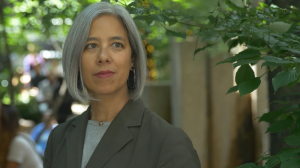Susan Choi: Interrogator of Truth
Description
Susan Choi’s books reflect her skepticism of authority. As Tori Marchiony reports, the National Book Award-winning author even questions the credibility of characters she creates.
Featured Artists

Susan Choi is an admired fiction writer and a lecturer of English at Yale University. Her novels explore themes of identity and power structures.
Choi was born in Indiana to a Korean father and an American Jewish mother. She moved to Houston, TX, after their divorce. She earned a BA in literature at Yale and an MFA at Cornell University, then worked as a fact checker for The New Yorker. Her first novel, The Foreign Student (1998), won an Asian-American Literary Award. Her second novel, American Woman (2003), which fictionalized the story of heiress turned bank robber Patty Hearst, was a finalist for the Pulitzer Prize.
Her acclaimed fifth book, Trust Exercise (2019), which deconstructed memories of a physical relationship between a teenager and an older man, captured the zeitgeist of the #MeToo movement. It won the 2019 National Book Award for Fiction. Her first book for children, Camp Tiger, was also published in 2019.
Transcript
The National Book Award winner and Pulitzer Prize finalist Susan Choi refuses to shy away from life’s gray areas. She writes about all things incriminating, questionable, and uncomfortable. Each of her narratives are an interrogation.
Susan Choi: I’ve been interested in a lot of different sort of moments in history that I think often are about a crisis in the way power is being used.
Choi’s celebrated 2008 novel, A Person of Interest, explores the subjectivity of truth through a tenured near retirement mathematics professor named Lee, who finds himself caught up I the FBI investigation into a deadly bombing at his university.
(Excerpt from A Person of Interest):
“I’m telling you the truth”, if that’s the case then would you like to take a polygraph Morrison said. The howl in Lee’s ears ebbed away like the tide rushing out. He wasn’t sure he’d heard correctly. “A lie detector test?”, he asked tentatively afraid Morrison might burst out laughing. But the other man’s face showed no tending toward humor. “At this point, your disclosing everything the polygraph can only serve you well.” “A lie detector test implies the person being tested is a suspect,” Lee said after a moment. Despite being on the defensive, he spoke to Morrison admonishingly. He felt offended to his core, at the same time he was still a prisoner of panic. The panic interfered with his indignation, it would soon deplete it.
Choi employs caution and objectivity in her stories. Never laying blame, but presenting multiple points of view to ask questions like, “who should be trusted?” and “who should be held responsible?” But despite the sharp focus in her work today, Susan Choi didn’t always have such a disciplined approach.
Choi: I was really into the texture and experience of writing, mainly because it was so much more fun before, before computers my mom had an old electric typewriter that was really loud, and I would bang away and it made this like deafening racket that was like very, it felt very consequential to be doing that.
Choi held fast to her dream of becoming a writer, even though at first she didn’t know how. But since making her award-winning debut with The Foreign Student in 1988, Choi has found her voice. Consistently writing stories of the salacious, the controversial. A fictionalized re-imagining of Patty Hearst, the publishing heiress turned fugitive, who was kidnapped by a left-wing extremist group in the 1970s. A romantic relationship born in the classroom between a married teacher and a promising student. And in her most recent novel, 2019’s National Book Award-winning Trust Exercise, a woman named Karen revisits memories of a physical relationship with a much older man. She was once flattered by the attention, but as an adult, she sees the violation.
(Excerpt from Trust Exercise):
By contrast with the first time they’d met, when she had felt herself so old but in fact had been so young, Karen now actually was old enough to understand that for Martin, there might have been no story at all. There might have been for this person who’d not merely touched but deformed her, no sensation of contact at all. He might not recognize her, if he did he might not recall a single detail of their past relationship.
Choi: The character of Karen struggles with the fact that she does feel that as a sixteen-year-old, she chose that older man. She wanted that older man’s attention, and at the same time, she wasn’t able to see the whole architecture of power and wasn’t able to see her deep disadvantage in trying to be the partner of this person who was so much older, so much more experienced, so much less sincere than she was. Something about that May-December romance, as it used to be so cutely referred to, spoke to me I think because a large part of my young womanhood was steeped in this idea that an older and more powerful man noticing you was a positive. And I don’t think I ever thought that consciously, but I know that that was an idea that like went straight to the bone for me, and probably lots of other women. I think it’s still true today.
Susan Choi doesn’t simply write to entertain. She forces readers to question power dynamics and authority figures. And though the line between right and wrong can be deceptively clear, she doesn’t claim to have all the answers. But that never stops her from asking some interesting questions.

